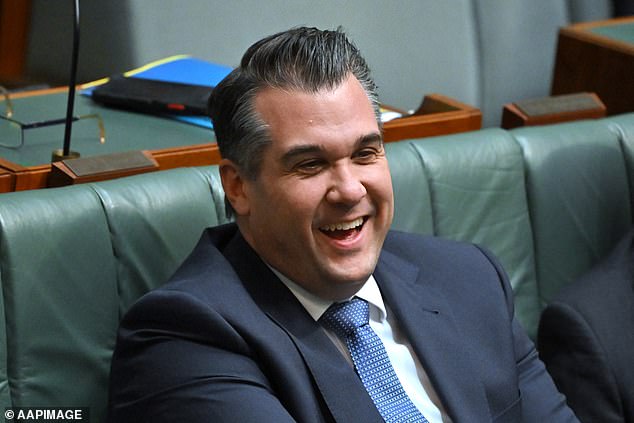- Scott Pape dismisses the Coalition's housing proposal
- Michael Sukkar aimed at adjusting lending criteria
- EXPLORE FURTHER: The Barefoot Investor advises Australians to prepare for potential increases in living costs.
The Barefoot Investor has strongly criticized a suggestion from the Coalition to relax borrowing regulations with the aim of assisting Australians in purchasing homes, arguing that it will merely inflate real estate costs.
Scott Pape made this assertion following an inquiry from worried tenant Penny, who reached out regarding the plan advocated by the opposition party. housing minister Michael Sukkar.
"I am 32 years old, work as a teacher, and currently live with my boyfriend who is also a teacher," she shared.
We're putting in a lot of effort and cutting costs wherever possible, yet the dream of homeownership seems out of reach. Melbourne It still seems unattainable.
We don't have affluent parents or co-signers – my mother is also a renter, and my partner’s parents are still paying for their house.
I was scrolling through property updates when I came across an article citing the Liberals' intentions to relax borrowing regulations to assist purchasers who don’t have financial support from their parents. Does this policy change hold significance for individuals like us, or is it merely election-season chatter?
Mr Sukkar disclosed on Tuesday that his plan involves focusing on the serviceability buffer for home loans should the Coalition win the upcoming federal election. election .
The regulatory body for finance – the Australian Prudential Regulation Authority – mandates that banks must assess home loan applicants based on their capacity to manage their mortgage payments considering both the prevailing interest rates as well as an extra three percent.

Previously, the buffer stood at 2.5 percent, but it was increased during the Covid pandemic.
The Barefoot Investor stated that the buffer serves as a 'stress test'.
"When applying for a mortgage, the bank verifies whether you could still manage the payments even if interest rates increase," he penned in his newspaper column. NewsCorp .
'If the interest rate is 6 percent, they check if you can still manage payments at 9 percent.'
It's referred to as a "stress test" — designed to prevent individuals from taking on more debt than they can handle when (let’s face it, if) interest rates increase.
And, as a financial counselor, I believe this is a very prudent policy that maintains pressure on bankers.
Mr. Pape mentioned that Mr. Sukkar had a different perspective on the matter.
"He contends that reducing the down payment would enable first-time homebuyers to secure larger loans. This statement holds merit," he noted.

But let's consider this for approximately six seconds: Reducing the buffer would allow everybody to borrow more money, which they surely would, and this increase in borrowing power would only push housing prices higher.
Sukkar’s plan is akin to eying the last withered dim sim that has been languishing in the servo steam cabinet since last weekend.
Penny, I understand you're hungry, but if you decide to consume whatever Sukkar is offering, ensure you keep a hazmat suit ready, a frozen toilet paper roll, and contact a plumber beforehand.
When the announcement was made, Mr. Sukkar stated that there was an inherent prejudice supporting wealth passed down through generations.
"At present, individuals in Australia who do not have access to the 'Bank of Mum and Dad' face higher lending expenses — despite the fact that their real level of risk might be the same or even smaller," he explained.
That represents a systematic preference for wealth passed down through generations. We aim to eliminate this bias.
The Coalition refuses to tolerate a scenario where a cohort of Australians lacks the same chances for homeownership as past generations had.
Read more.png)